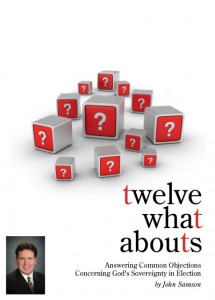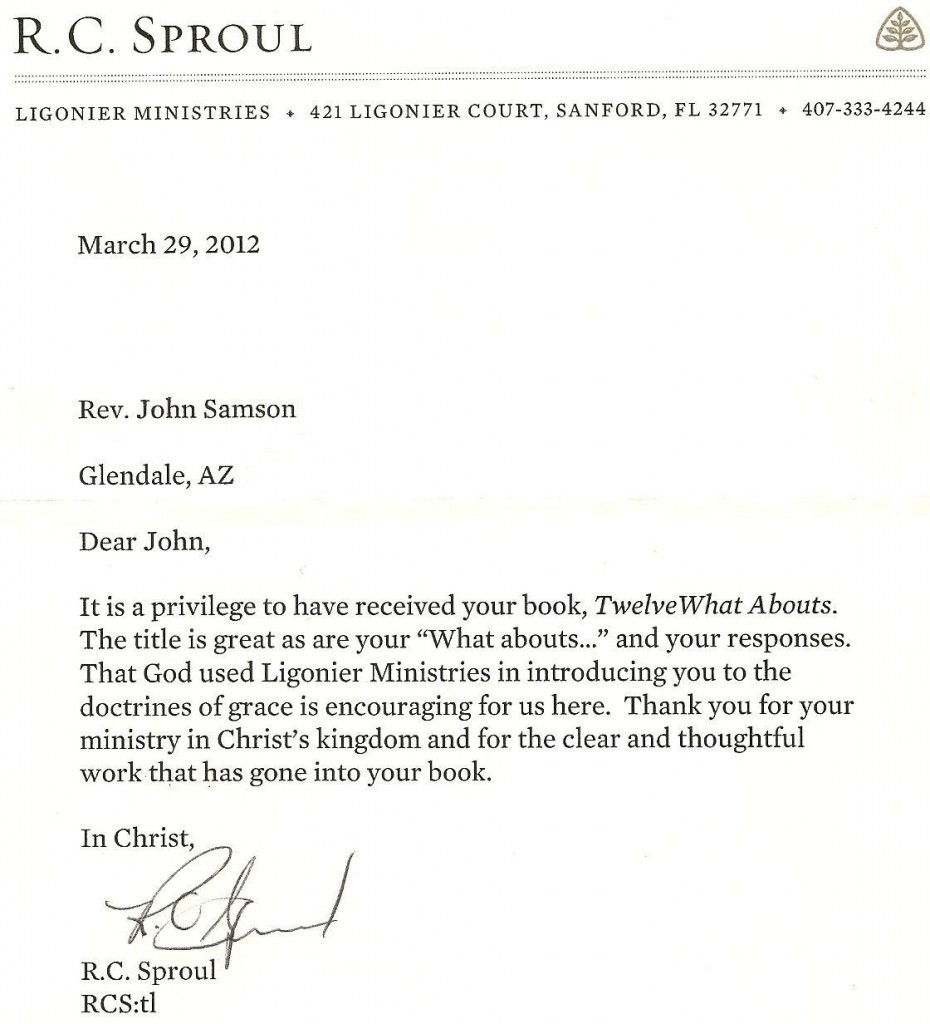 An author writes with the hope of being read, and more than that, not so much by my words, but by His word, His truth and His measureless grace as it is unfolded in the pages. May it be something of a tool in His hands for this purpose, for His glory.
An author writes with the hope of being read, and more than that, not so much by my words, but by His word, His truth and His measureless grace as it is unfolded in the pages. May it be something of a tool in His hands for this purpose, for His glory.
ENDORSEMENTS:
“It is a privilege to have received your book, ‘Twelve What Abouts.’ The title is great as are your ‘what abouts,’ and your responses. Thank you for your ministry in Christ’s kingdom and for the clear and thoughtful work that has gone into your book.” – Dr. R.C. Sproul, President, Ligonier Ministries
“Sometimes a single misapprehension or sticky question stands in the way of an honest believer’s examination of the doctrines of grace. John Samson answers those questions with a pastoral heart, yet with biblical fidelity.” – Dr. James White, Alpha and Omega Ministries
“After finishing a sermon from Ephesians 1, I was immediately confronted by three hostile young visitors who asked the question, ‘What about John 3:16?’; as if the Bible contradicted itself. This non-thinking, non-theological, feelings-oriented mindset is typical of today’s postmodern generation. Pastor Samson has given us a warm and simple (without being simplistic) introduction to the Doctrines of Grace, so this type of ignorance can be biblically combated. This book is a very helpful tool to give to a young Christian or to someone newly encountering the truths of free and sovereign grace. Distribute it widely.” – Rev. Earl M. Blackburn, Heritage Baptist Church, Shreveport, Louisiana
“I want to commend, to all readers seeking an honest look into these matters, this very fine treatment in which Pastor John Samson carefully answers the most common objections to the biblical doctrine of divine election. John is one of the most passionate Christians I know, whose number one purpose is to make Christ known. This work on the doctrine of election is no exception. In it you will find that the purpose of election is to bring all glory to Jesus Christ in our salvation.” – John Hendryx, from the Foreword
The book is available in eBook and paperback at the links on the right hand side of the page, as well as at amazon.com in eBook here and in paperback here and barnesandnoble.com.
The paperback edition is also available in the United Kingdom here for 10 pounds with free delivery (in the UK).
TABLE OF CONTENTS (168 pages)
Foreword by John Hendryx
A Word to the Reader
Chapter One: The Place to Start – Amazed by Common Grace
Chapter Two: The Wind Blows Where it Wishes
Chapter Three: A Surprising Journey
Chapter Four: What About the Love of God? (Part One)
Chapter Five: What About the Love of God? (Part Two)
Chapter Six: What About Free Will?
Chapter Seven: What About God’s Foreknowledge?
Chapter Eight: What About John 3:16?
Chapter Nine: What About 2 Peter 3:9?
Chapter Ten: What About 1 Timothy 2:4?
Chapter Eleven: What About Matthew 23:37
Chapter Twelve: What About 1 Timothy 4:10?
Chapter Thirteen: What About John 12:32?
Chapter Fourteen: What About Reprobation?
Chapter Fifteen: What About Lost Loved Ones?
Chapter Sixteen: What About Prayer and Evangelism?
Chapter Seventeen: Saving Faith
Chapter Eighteen: The Flaming Missiles of the Devil
Chapter Nineteen: Spiritual Dyslexia
Chapter Twenty: As the King’s Herald
Further Recommended Resources
BOOK REVIEWS:
INTERVIEWS:
Radio Interview: Backpack Radio interview, April, 2012
Video: Dr. James White’s Dividing Line interview, January 24, 2012

 Grace, grace is exactly and entirely opposite to that! The scandal of grace is that God saw us as His sworn enemies, as children of wrath, children of the devil, and with His image marred and trampled in the dirt, and while we were still shaking our fists at Him, engaged each day in cosmic treason and total defiance of Him, He was willing to pay the ridiculous ransom price of the death of this precious Son to redeem us.
Grace, grace is exactly and entirely opposite to that! The scandal of grace is that God saw us as His sworn enemies, as children of wrath, children of the devil, and with His image marred and trampled in the dirt, and while we were still shaking our fists at Him, engaged each day in cosmic treason and total defiance of Him, He was willing to pay the ridiculous ransom price of the death of this precious Son to redeem us. I sent a copy of my book to Dr. R. C. Sproul, thanking him for his ministry and alerting him to the fact that he had been greatly used of God in helping me come to understand God’s Sovereignty in salvation. I told him that chapter 3 of the book describes something of my theological journey and his involvement in that process.
I sent a copy of my book to Dr. R. C. Sproul, thanking him for his ministry and alerting him to the fact that he had been greatly used of God in helping me come to understand God’s Sovereignty in salvation. I told him that chapter 3 of the book describes something of my theological journey and his involvement in that process.
 By Dr. Sinclair Ferguson
By Dr. Sinclair Ferguson God is a God who dispenses blessing and cursing. Deuteronomy 28 is a chapter devoted to this theme, and it is one found throughout the pages of Scripture, both in the Old and New Testaments. It makes no biblical sense whatsoever to say that one believes in one and not the other. Blessings are real and so are curses.
God is a God who dispenses blessing and cursing. Deuteronomy 28 is a chapter devoted to this theme, and it is one found throughout the pages of Scripture, both in the Old and New Testaments. It makes no biblical sense whatsoever to say that one believes in one and not the other. Blessings are real and so are curses. It was a great pleasure to meet the hosts of “Backpack Radio” as they conducted a one hour radio interview of me regarding my new book.
It was a great pleasure to meet the hosts of “Backpack Radio” as they conducted a one hour radio interview of me regarding my new book.